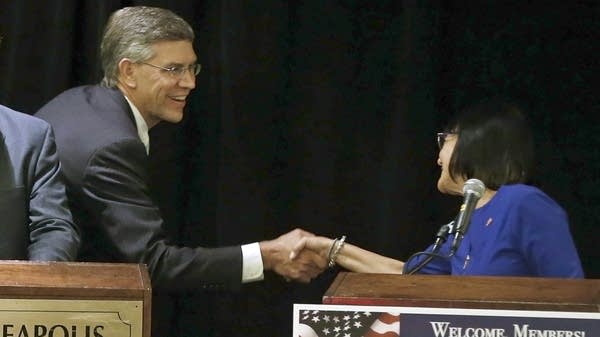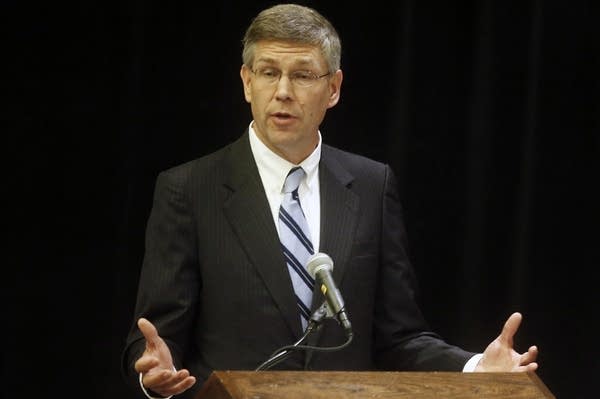Paulsen, Bonoff clash on policy, Trump in MN 3rd debate

Go Deeper.
Create an account or log in to save stories.
Like this?
Thanks for liking this story! We have added it to a list of your favorite stories.
Incumbent Republican U.S. Rep. Erik Paulsen and state Sen. Terri Bonoff, DFL-Minnetonka, made it nearly halfway through their first hourlong debate Wednesday before someone mentioned Republican presidential nominee Donald Trump.
Most political observers believe Trump will have a tough time winning in Minnesota's suburban 3rd Congressional District, and Bonoff has tried to make an issue of Paulsen's refusal to denounce Trump. She said her outrage over some of Trump's statements led her to run for Congress.

"That Congressman Paulsen has not from Day One denounced that man as a leader is not political courage," Bonoff told the debate audience of chamber of commerce members at a Minnetonka hotel. "I believe it's our job to shape the political winds and not to stand back and understand how they're going and then act in response."
Paulsen, who's scored lopsided wins the past three elections but looks to be in a much more competitive race now, responded that he hasn't endorsed anyone for president and that Trump has not yet earned his vote.
Turn Up Your Support
MPR News helps you turn down the noise and build shared understanding. Turn up your support for this public resource and keep trusted journalism accessible to all.
He questioned why Bonoff hasn't denounced Democratic nominee Hillary Clinton for proposing to raise taxes and increase federal spending.

Paulsen, however, spent more time trying to link Bonoff to U.S. House Democratic Leader Nancy Pelosi than to Clinton.
"One of the first and most important votes that a member of Congress will cast when they get elected is who the speaker will be," Paulsen said. "I'm going to vote for (current U.S. House Speaker) Paul Ryan. Terri's going to vote for Nancy Pelosi."
The debate came more than 11 weeks before Election Day. At this point, it's unclear whether Paulsen and Bonoff will have another. Both campaigns said no additional debates have been scheduled.
Paulsen tried to move past the presidential issue by challenging Bonoff to sign a pledge rejecting campaign spending by outside, third-party political groups.
"People in this district deserve a race that is going to be about issues and about our records," he said. "By agreeing to this, we can be accountable to races we run. I've signed the pledge. I brought it with me today and hope you will join me in signing it."
In response, Bonoff criticized Paulsen for taking large campaign contributions from special interest groups and political action committees. She said she would sign the pledge if giving back that money was also part of the deal.
"I'll do that if we both return our PAC money, all PAC money," she said. "We just say this is going to be a race based on individual donors, and then let's go for it."
At last report Paulsen had much more campaign cash on hand than Bonoff.
The two candidates clashed on several policy issues, including health care, transportation funding, taxes and reducing the national debt. They have similar views on the need for strong foreign trade policy, including the Trans-Pacific Partnership.
Paulsen is seeking a fifth term in the U.S. House, where he serves on the powerful, tax law-writing Ways and Means Committee. He emphasized his track record of working on bipartisan legislation.
"So no matter who is president, whether it's Donald Trump or Hillary Clinton, I'm going to continue to be a constructive voice," he said. "I'm going to continue to be a serious leader. I'm going to continue to be a reform-minded, results-oriented and solution-oriented person, working across the aisle to actually get things done."
Bonoff is serving her fourth term in the Minnesota Senate, where she chairs the higher education committee. She made her case to the business group that change is needed in the 3rd District.
"If your business isn't effective, would you say 'I want to keep the leaders in place because they're nice guys,'" she asked. "Or would you say, 'No, it's time for a change,' and bring leaders there who have a track record of turning things around?"


